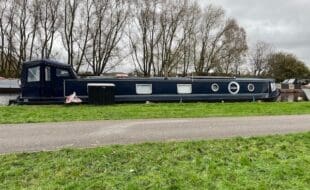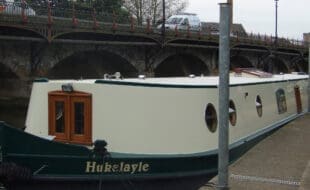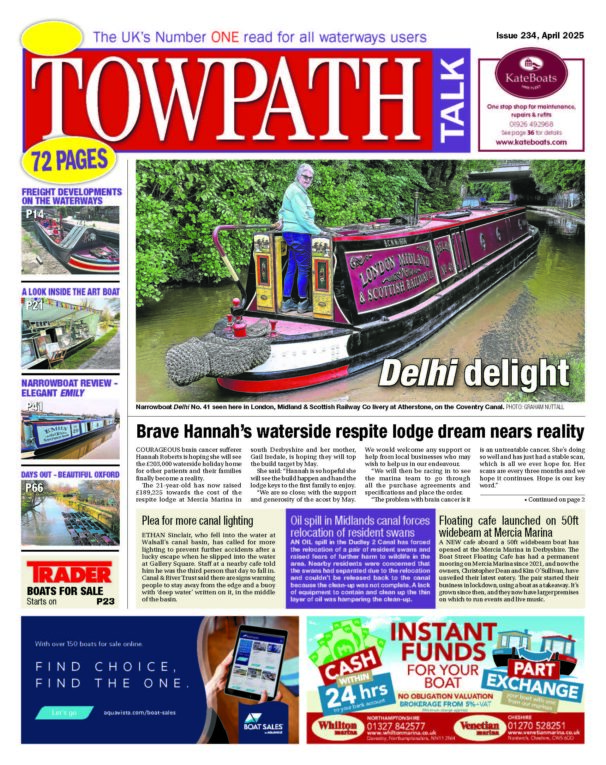By Janet Richardson
ONE of the regular features of the London Boat Show is the presentation of The Yacht Harbour Association’s prestigious Marina of the Year Awards.
Voted for by berth holders, they recognise the best of TYHA’s Gold Anchor accredited marinas, not only on the UK’s inland waterways but from all around the world.
But how does the Gold Anchor scheme work and how are the marinas assessed? I recently met TYHA assessor Tony Dye (pictured below, left) and TYHA general manager Jon White (right, with Tingdene’s Windsor Racecourse Marina general manager Neill Walker, centre) at the marina, which was undergoing its
three-yearly inspection.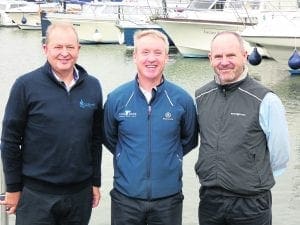
The previous week, the marina had hosted assessors not only from the UK but from Ireland, mainland Europe and Turkey on a course to make sure everyone was up to speed with the new assessment programme operated by TYHA, which has members in nearly 30 countries.
Tony explained that all of the Gold Anchor marinas in the UK are British Marine members, which automatically includes membership of TYHA. For instance entry level accreditation as a Gold Anchor Marina is self-assessed and is only available to TYHA members at a cost of £100. Marinas with two to five Gold Anchors are assessed by an assessor and the fee ranges from £850 for up to 100 berths to £2000 for 2001-plus for members (non-members £2410-£3685). These fees become due each time an assessment is conducted.
The highest grade is the 5 Gold Anchor Platinum award; there is currently only one of these with Porto Montenegro
near Tivat in Montenegro being awarded this year.
Assessments are carried out on a three-year cycle, starting with an application – or re-application – form which gives details of the scheme and costs as well as a checklist including a marina profile, on-site facilities, health and safety regulations and technical compliance such as the provision of wash-ashore access, fire extinguishers, electricity supply and safety ladders.
The checklist shows applicants what they need to prepare for the assessment. “Each time we need to get them to sign to say they want to carry out the assessment and they will comply with our terms and conditions,” Tony said.
While it makes sense cost-wise to become a TYHA member, this is not essential and fees are maintained at a realistic level.
Mystery shopper
Other checks are carried out before the assessment: “A ‘mystery shopper’ process is triggered by us back in the office. This can be by telephone, email or face-to-face and will be used as part of the score,” Tony continued. Berth holders are also sent a questionnaire.
All the assessors contracted by TYHA are Certified Marina Managers (CMM) and also act in a consultative role giving advice to members. There are over 300 around the world and about 90 in the UK. British Marine operates in conjunction with Marina Industries Association (MIA) in Australia and offers a series of Global Marina Institute (GMI) qualifications from boatyard operation to marina manager training. Other qualifications include IMM (Intermediate) and AMM (advanced) manager qualifications.
Tony explained they can start with the marina operatives course – a self-assessed scheme that a marina manager signs for and once they have achieved the criteria, they can move on to more advanced qualifications.
TYHA’s assessors cannot be employed directly by a marina as there could be a conflict of interests. Tony continued: “Managers understand that we have all run marinas on the practical side. With some assessment schemes, an authorising body will use professional assessors but for us the key part is the recommendations from our experts.”
He visits between 25-30 marinas a year in the UK, Europe and the Middle and Far East. “We can offer advice on how trends are going, what people are looking at and how the market is going. Benefits include marketing opportunities, staff motivation and improving standards as well as an external pair of eyes every three years to spot any areas which may have deteriorated.”
Jon added that on the marketing side, TYHA is represented at boat shows such as London and Crick and exhibits panels identifying where the participating marinas are. “We are keen to expand the scheme’s profile and it is key for us that boaters recommend this has value as well.
“The assessment is an audit of the marina operations – boaters can be confident that it meets industry standards. Gold Anchor is all about giving confidence to the boat owner and anyone using the marina.”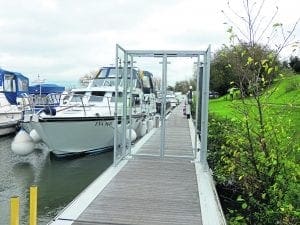
Once a marina is accredited, it will receive marketing materials such as flags, plaques, certificates and stickers so it can show off its accreditation as well as digital resources for website use. Pictured (right) is one of the new bespoke security gates.
Action plan
Explaining the timescale, he said that when a marina is coming round for its three-year assessment, it will be notified three months ahead. “They will fill out the paperwork and we will appoint an assessor. A draft report and an action plan goes out to the marina, the whole process taking around six months to final report.”
This is sometimes quicker or as in the case of the Windsor Racecourse Marina, where Tony has been working for over a year because of development works taking place, this can take longer. “We sometimes do a pre-assessment and in this case because of recently completed pontoon works, we may ask for some information beforehand. Otherwise it is all done on the day,” he said.
TYHA has a policy that an individual assessor can conduct two assessments, that marina is then passed to another member of the team. If Tony is re-assessing a marina which he did not assess last time, he also likes to have a copy of the previous report before he visits to check if required actions from a previous assessment have
been completed.
In the action plan there may be an opportunity to increase a score before the final report. “Because it is a members’ association it is viewed that it is better to have a scheme that is about improving facilities and customer services. We will keep up a dialogue with the marina.”
Jon added: “We are always available via email or on the phone. We are always there to help. It is quite different from some accreditation schemes – more of a development process.
The marina has 30 days to come back with comments on the report and how they see the recommendations. Tony explained: “We put in required actions which they must meet to reach a certain award grade, also recommended actions such as things they could do to improve the ambience of the site.
“We invariably find that the berth holders’ questionnaire and mystery shopper elements are not always available. But these can come in useful if there are areas where we have any concerns. We also carry out a full and detailed site walk, ensure emergency equipment is in place, check the dates of fire extinguishers and that there is fire prevention and spill equipment on the fuel berth and, if possible, have a word with customers.
“I work off a checklist and a diagram showing the layout of pontoons, locations of safety equipment and instructions of what to do in an emergency. Once I have had a walk round, I have about half an hour to make some notes and sum up what I have seen outside. I then start on the marina’s documentation, for instance the majority of boats here on annual contracts, rolling contracts start any time of year.”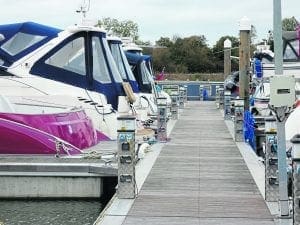
He checks service records for all the equipment – machinery such as hoists must have inspection certificates complying with insurers’ requirements (usually six months) while it is 12 months for electrical installations on the pontoons – and needs to see photographic evidence of equipment being installed.
Tony also asks the marina owner or manager about measures such as lifejackets and lone worker policies and flooding conditions. “I then make up two lists at the end of the report of recommended and required actions.
“We have to insure that we maintain standards and have a standards panel. If a marina is borderline, the assessor is in consultation about how it has scored or if there is going to be a change in the number of Gold Anchors awarded, we will put this through the
standards panel.”
Tony explained: “If I do a report and the marina feels they have been under scored, they can come back to the standards panel and appeal. The panel comprises three industry professionals and an assessor and if it was one of my marinas I would stand down and another assessor would be used.”

